 W
WThe first season of the anime show Yu-Gi-Oh! 5D's consists of 26 episodes, and follows Yusei Fudo as he escapes from Satellite, and learns about his destiny as a Signer. The season uses two pieces of theme music; the opening theme is 'Kizuna' by Kra whilst the ending theme is 'Start' by Masataka Nakagauchi. It is known as the Signers Arc in Japan, and the Fortune Cup Duels in the US or by US fans as Yu-Gi-Oh! Season 9. It is the first Yu-Gi-Oh! series to be produced in 16:9 widescreen, although it was letterboxed in the United States broadcast.
 W
WThe second season of Yu-Gi-Oh! 5D's runs from episodes 27 to 64. The story revolves around the battle between the united Signers, and the evil Dark Signers. The season uses two pieces of theme music; the opening theme is 'LAST TRAIN -Atarashii Asa-' by knotlamp, whilst the ending theme is 'Cross-game' by Alice Nine.
 W
WThe third season of Yu-Gi-Oh! 5D's lasts from episodes 65 to 92. Following the battle with the Dark Signers, the city is reformed and turbo dueling has changed, but a new threat looms, as the 3 Emperors of Yliaster come into play. This season uses two pieces of theme music. The opening theme is "Freedom" by La Vie, while the ending theme is "O-Zone" by Vistlip. Certain episodes also use the insert song "You Say" by La Vie.
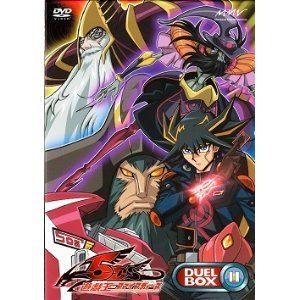 W
WThe fourth season of Yu-Gi-Oh! 5D's lasts from episodes 93 to 134. As the WRGP begins, the 3 Emperors of Yliaster begin to make their move. The show uses seven pieces of theme music. For episodes 93 through 103, the opening theme is "Freedom" by La Vie, while the ending theme is 'O-Zone' by Vistlip. For episodes 104 to 129, the opening theme is "BELIEVE IN NEXUS" by Masaaki Endoh, while the ending theme is "Close to You" by Alvino ~Alchemy vision normal~. For episodes 130 to 154, the opening theme is "Road to Tomorrow - Going My Way!" by Masaaki Endoh, while the ending theme is "Future Colors" by Plastic Tree. Certain episodes use the insert song: "Clear Mind" by Masaaki Endoh.
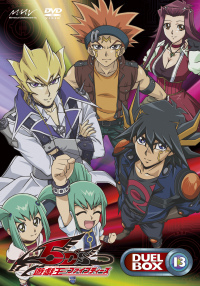 W
WThe fifth and final season of Yu-Gi-Oh! 5D's lasts from episodes 135 to 154. As the Ark Cradle descends on New Domino City, the final stage of Yliaster's plan is set into motion. This season uses four pieces of theme music. For episodes 130 to 154, the opening theme is "Road to Tomorrow - Going My Way!" by Masaaki Endoh, while the ending theme is "Future Colors" by Plastic Tree. Certain episodes use the insert song: "Clear Mind" by Masaaki Endoh. Episode 154 uses the insert song: "The Melody of Promises," which is also by Masaaki Endoh.
 W
WYu-Gi-Oh! Arc-V is the fourth spin-off anime in the Yu-Gi-Oh! franchise, produced by Nihon Ad Systems and broadcast by TV Tokyo. It is directed by Katsumi Ono and produced by Studio Gallop. Its plot focuses on Yuya Sakaki. Yuya is a boy seeking to become the greatest entertainer in Action Duels who brings forth a new summoning method to Duel Monsters known as Pendulum Summoning. The anime premiered in Japan on April 6, 2014 and released internationally by 4K Media Inc..
 W
WYu-Gi-Oh! Arc-V is the fourth spin-off anime in the Yu-Gi-Oh! franchise, produced by Nihon Ad Systems and broadcast by TV Tokyo. It is directed by Katsumi Ono and produced by Studio Gallop. Its plot focuses on Yuya Sakaki. Yuya is a boy seeking to become the greatest entertainer in Action Duels who brings forth a new summoning method to Duel Monsters known as Pendulum Summoning. This season covers Yuya and his friends battling in the Synchro Dimension.
 W
WYu-Gi-Oh! Arc-V is the fourth spin-off anime in the Yu-Gi-Oh! franchise, produced by Nihon Ad Systems and broadcast by TV Tokyo. It is directed by Katsumi Ono and produced by Studio Gallop. Its plot focuses on Yuya Sakaki. Yuya is a boy seeking to become the greatest entertainer in Action Duels who brings forth a new summoning method to Duel Monsters known as Pendulum Summoning. This season takes place right after Yuya, Zuzu, Gong, Shay, and Sylvio got sucked into a wormhole that sent them to two different dimensions. Yuya, Gong, Shay, and Sylvio were sent to the Xyz Dimension, while Zuzu was sent to the Fusion Dimension.
 W
WYu-Gi-Oh! Capsule Monsters is a twelve-episode mini-series commissioned and produced by 4Kids Entertainment in the United States and animated by Studio Gallop, in Japan. The miniseries was produced exclusively for international broadcast, making it the only anime series in the Yu-Gi-Oh! franchise to not see a release in Japan. It takes place between episodes 198 and 199 of Yu-Gi-Oh! Duel Monsters.
 W
WThe first season of Yu-Gi-Oh! Duel Monsters, based on the manga by Kazuki Takahashi, premiered in Japan on April 18, 2000, and concluded on April 3, 2001, on TV Tokyo. The season was directed by Kunihisa Sugishima, and written by Junki Takegami, Masashi Sogo, and Shin Yoshida. The English version of this season premiered in the United States on September 29, 2001 on Kids' WB, and concluded on November 9, 2002.
 W
WThe second season of Yu-Gi-Oh! Duel Monsters, based on the anime by Kazuki Takahashi, premiered in Japan on April 10, 2001, and concluded on March 5, 2002, on TV Tokyo. The English adaptation of this season aired in the United States from November 16, 2002, and concluded on November 1, 2003, on Kids' WB. The season was directed by Kunihisa Sugishima, and written by Junki Takegami, Masashi Sogo, and Shin Yoshida.
 W
WThe third season of the anime series Yu-Gi-Oh! Duel Monsters, created by Kazuki Takahashi, was originally broadcast from March 12, 2002, to February 11, 2003. The English adaptation, broadcast on Kids' WB, aired from November 1, 2003 to September 4, 2004.
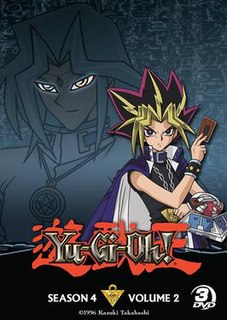 W
WThe fourth season of Yu-Gi-Oh! Duel Monsters, was broadcast in Japan on TV Tokyo from February 18 to December 17, 2003. In the United States, the season was broadcast under the subtitle Waking the Dragons, and aired from September 11, 2004 to May 28, 2005 on Kids' WB.
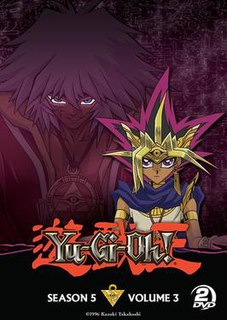 W
WThe fifth and final season of Yu-Gi-Oh! Duel Monsters aired in Japan on TV Tokyo from December 24, 2003 to September 29, 2004. In the United States, the season aired from August 27, 2005 to June 10, 2006 on Kids' WB and broadcast under the Grand Championship and Dawn of the Duel subtitles.
 W
WYu-Gi-Oh! Duel Monsters GX is the fourth addition to the Yu-Gi-Oh! anime meta-series, as well as the first main spin-off series. The plot centers around Jaden Yuki and his friends, and tells of their adventures at Duel Academy, a school that teaches students how to play the card game Duel Monsters. Season one, known as the Seven Stars Saga or by Fans as, Yu-Gi-Oh! Season 6 covers their first year at the Academy. It was broadcast by 4Kids Entertainment as simply Yu-Gi-Oh! GX.
 W
WYu-Gi-Oh! Duel Monsters GX is the fourth addition to the Yu-Gi-Oh! anime meta-series, as well as the 1st main spin-off series. The plot centers around Jaden Yuki and his friends, and tells of their adventures at Duel Academy, a school that teaches students how to play the card game Duel Monsters. Season two, the Society of Light Saga or by fans as Yu-Gi-Oh! Season 7, covers their second year at the Academy. This season was broadcast by 4Kids Entertainment as Yu-Gi-Oh! GX.
 W
WYu-Gi-Oh! Duel Monsters GX is the fourth addition to the Yu-Gi-Oh! anime meta-series, as well as the 1st main spin-off series. The plot centers around Jaden Yuki and his friends, and tells of their adventures at the Duel Academy, a school that teaches students how to play the card game Duel Monsters. Season three, the Dimension World Saga or by fans as Yu-Gi-Oh! Season 8', covers their third year at the Academy and the series' darker turn. This season was broadcast by 4Kids Entertainment as Yu-Gi-Oh! GX.
 W
WYu-Gi-Oh! Sevens is the sixth spin-off anime series in the Yu-Gi-Oh! franchise and the tenth anime series overall. It is produced by Bridge and broadcast on TV Tokyo. The series is directed by Nobuhiro Kondo. The series follows Yūga and his friends as they show off the delights of Rush Duels while under the watchful eye of the Goha Corporation that oversees the city. On April 28, 2020, it was announced that after episode 5, the remaining episodes would be delayed for five weeks due to the effects of the COVID-19 pandemic. On July 10, 2020, it was announced it will be delayed again due to the aforementioned pandemic and will resume on August 8, 2020. Starting April 4, 2021, it aired on Sunday at 7:30 AM JST. The opening theme of the first season is "Nanananananana" (ナナナナナナナ), performed by Yusuke Saeki while the ending theme is "Goha #7 Elementary School Song" , performed by Hiiro Ishibashi, Taku Yashiro, and Natsuki Hanae.
 W
WYu-Gi-Oh! VRAINS is the fifth main spin-off anime series in the Yu-Gi-Oh! franchise. It is the sixth Yu-Gi-Oh! anime series. It is produced by Gallop and broadcast by TV Tokyo. The series is directed by Masahiro Hosoda. The series follows Yusaku Fujiki. It takes place in a high school environment in Den City. The series features Charisma Duelists who use VR and are similar to YouTubers. The show's theme is "Let's take one step forward and try it!" This season uses three pieces of theme music. From episodes 1–46, the first opening theme is "With The Wind" by Hiroaki "Tommy" Tominaga. From episodes 1–24, the first ending theme is "Believe In Magic" by Royga. From episodes 25–46, the second ending theme is "Writing Life" by Goodbye Holiday.
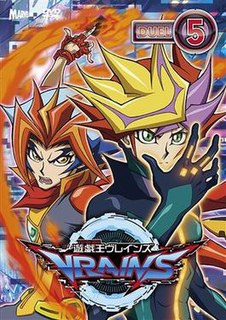 W
WYu-Gi-Oh! VRAINS is the fifth main spin-off anime series in the Yu-Gi-Oh! franchise. It is the sixth Yu-Gi-Oh! anime series. It is produced by Gallop and broadcast by TV Tokyo. The series is directed by Masahiro Hosoda. The series follows Yusaku Fujiki. It takes place in a high school environment in Den City. The series features Charisma Duelists who use VR and are similar to YouTubers. The show's theme is "Let's take one step forward and try it!" This season uses four theme songs. From episodes 47–102, the first opening theme is "Go Forward" by Kimeru. From episodes 47–70, the first ending theme is "BOY" by uchuu. From episodes 71–95, the second ending theme is "Glory" by Band-Maid. From episodes 96–102, the third ending theme is "Are You Ready?" by Bis.
 W
WYu-Gi-Oh! VRAINS is the fifth main spin-off anime series in the Yu-Gi-Oh! franchise. It is the sixth Yu-Gi-Oh! anime series. It is produced by Gallop and broadcast by TV Tokyo. The series is directed by Masahiro Hosoda. The series follows Yusaku Fujiki and takes place in a high school environment in Den City. The series features Charisma Duelists who use VR and are similar to YouTubers. The show's theme is "Let's take one step forward and try it!" This season uses two theme songs. From episodes 103 to 120, the opening theme is "Calling" by Kimeru, while the ending theme is "Are You Ready?" by BiS.
 W
WYu-Gi-Oh! Zexal is the fourth Yu-Gi-Oh! anime television series by Nihon Ad Systems and TV Tokyo. It is directed by Satoshi Kuwahara and produced by Studio Gallop. The series aired in Japan on TV Tokyo between April 11, 2011 and September 24, 2012. A second series, Yu-Gi-Oh! Zexal II, began airing from October 7, 2012. The show also premiered on Toonzai in North America on October 15, 2011. The story follows the young duelist Yuma Tsukumo who partners up with an ethereal spirit named Astral, as they search for the 100 Number Duel Monsters cards, which will restore Astral's memories.
 W
WYu-Gi-Oh! Zexal is the fourth Yu-Gi-Oh! anime television series by Nihon Ad Systems and TV Tokyo. It is directed by Satoshi Kuwahara and produced by Studio Gallop. The series aired in Japan on TV Tokyo between April 11, 2011 and September 24, 2012. A second series, Yu-Gi-Oh! Zexal II, began airing from October 7, 2012. The show also premiered on Toonzai in North America on October 15, 2011. It is the first Yu-Gi-Oh! series to be broadcast in high-definition in United States. The story follows the young duelist Yuma Tsukumo who partners up with an ethereal spirit named Astral, as they search for the 100 Number Duel Monsters cards, which will restore Astral's memories.
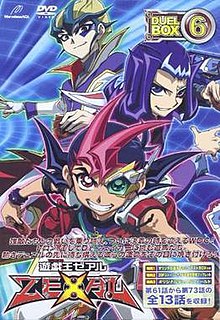 W
WYu-Gi-Oh! Zexal is the fourth Yu-Gi-Oh! anime television series by Nihon Ad Systems and TV Tokyo. It is directed by Satoshi Kuwahara and produced by Studio Gallop. The series aired in Japan on TV Tokyo between April 11, 2011 and September 24, 2012. A second series, Yu-Gi-Oh! Zexal II, began airing from October 7, 2012. The show also premiered on Toonzai in North America on October 15, 2011. The story follows the young duelist Yuma Tsukumo who partners up with an ethereal spirit named Astral, as they search for the 100 Number Duel Monsters cards, which will restore Astral's memories.
 W
WYu-Gi-Oh! Zexal II is the continuation of the Yu-Gi-Oh! anime television series, Yu-Gi-Oh! Zexal, produced by Nihon Ad Systems and TV Tokyo. Like the original, this series is directed by Satoshi Kuwahara and produced by Studio Gallop. The anime aired in Japan on TV Tokyo between October 7, 2012 to March 23, 2014, in a different time slot from that of the original series, while the English-language adaptation by Konami began airing in North America on The CW's Vortexx programming block from August 17, 2013. Due to Vortexx's re-airing of Zexal II episodes, new episodes have been moved to Hulu since July 14, 2014, beginning with Episode 114. Since then, most of the episodes have aired on Mondays on Hulu. On December 14, the episodes on Hulu began to be uploaded on Sundays instead of Mondays, with the exception of December 6, which saw Episode 135 being uploaded on a Saturday, because the following Sunday was National Pearl Harbor Remembrance Day. The regular airing pattern was broken again when the series finale aired on February 21, a Saturday, instead of on a Sunday. Following the end of the first series, Yuma and his friends now find themselves up against the evil forces of Barian World.
 W
WYu-Gi-Oh! Zexal II is the continuation of the Yu-Gi-Oh! anime television series, Yu-Gi-Oh! Zexal, produced by Nihon Ad Systems and TV Tokyo. Like the original, this series is directed by Satoshi Kuwahara and produced by Studio Gallop. The anime aired in Japan on TV Tokyo between October 7, 2012 to March 23, 2014, in a different time slot from that of the original series, while the English-language adaptation by Konami began airing in North America on The CW's Vortexx programming block from August 17, 2013. Due to Vortexx's re-airing of Zexal II episodes, new episodes have been moved to Hulu since July 14, 2014, beginning with Episode 114. Since then, most of the episodes have aired on Mondays on Hulu. On December 14, the episodes on Hulu began to be uploaded on Sundays instead of Mondays, with the exception of December 6, which saw Episode 135 being uploaded on a Saturday, because the following Sunday was National Pearl Harbor Remembrance Day. The regular airing pattern was broken again when the series finale aired on February 21, a Saturday, instead of on a Sunday. Following the end of the first series, Yuma and his friends now find themselves up against the evil forces of Barian World.
 W
WYu-Gi-Oh! Zexal II is the continuation of the Yu-Gi-Oh! anime television series, Yu-Gi-Oh! Zexal, produced by Nihon Ad Systems and TV Tokyo. Like the original, this series is directed by Satoshi Kuwahara and produced by Studio Gallop. The anime aired in Japan on TV Tokyo between October 7, 2012 to March 23, 2014, in a different time slot from that of the original series, while the English-language adaptation by Konami began airing in the United States on The CW's Vortexx programming block from August 17, 2013. Due to Vortexx's re-airing of Zexal II episodes and shut down in September 2014, new episodes moved to Hulu since July 14, 2014, beginning with Episode 114. Since then, most of the episodes have aired on Mondays on Hulu. On December 14, the episodes on Hulu began to be uploaded on Sundays instead of Mondays, with the exception of December 6, which saw Episode 135 being uploaded on a Saturday, because the following Sunday was National Pearl Harbor Remembrance Day. The regular airing pattern was broken again when the series finale aired on February 21, a Saturday, instead of on a Sunday. Following the end of the first series, Yuma and his friends now find themselves up against the evil forces of Barian World.